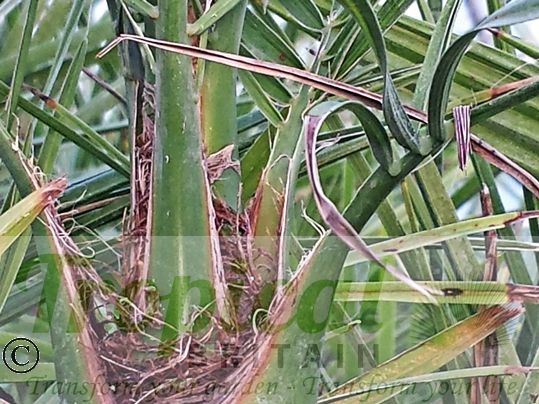Phoenix loureiroi var. pedunculata - Kashmir
Phoenix loureiroi var. pedunculata, the Mountain Date Palm is one of two infraspecific varieties of Phoenix loureiroi (the other is Phoenix loureiroi var. loureiroi) which both have a wide distribution across Asia. There are various forms of Phoenix loureiroi var. pedunculata and the form offered here is from the Kashmir region of northeastern Pakistan, at the northern extent of its range on the western edge of the Himalayas to altitudes of 1500m. It is hardy down to about -7C but it is sensible to protect it from freezing before this drop in temperature is reached. It is an elegant species with a medium slender trunk and relatively fine foliage, the individual leaflets emerging from the rachis at different angles to create stiff, plumose fronds. Like most Phoenix species it has short acanthophylls at the base of the petioles. It often flowers at a very early age, but as it is diocecious you will need at least two for it to set fruit. The green immature drupes turn yellow then ripen to a pinkish-purple then a blue-black colouration. Phoenix loureiroi var. pedunculata is usually a solitary form and suckers are rare but do occur.
This is an interesting and robust yet elegant palm for cultivation in the milder areas of the UK and south-west Eire. It is easy enough to grow but protection from severe cold is necessary. Not quite as tough for the UK as Phoenix theophrastii it is probably just behind Phoenix canariensis and Phoenix dactylifera in its hardiness rating. However it comes from a somewhat different climate than all these species: a wetter climate that is closer to UK conditions yet like most Phoenix palms it will also tolerate drought conditions. This Kashmir form is more suited to the UK conditions than other forms or geographical sources.
Phoenix loureiroi var. pedunculata is not exactly a beginner's palm but nontheless it is one that should be experimented with more often providing you have the right location and the time and commitment to give it the extra protection it needs in a cold winter. With the exception of the dwarf species Phoenix roebelenii, all Phoenix palms require space. This species will grow well within the London heat island but make sure you have a large enough property to accommodate it. Phoenix species planted up against a fence, or worse still, close to the house, look restricted and are potentially damaging.
Additional Information
| Order | Arecales |
|---|---|
| Family | Arecaceae |
| Sub-Family | Coryphoideae |
| Synonyms | Phoenix humilis var. pedunculata, Phoenix humilis var. robusta, Phoenix humilis var. typica, Phoenix loureiroi var. humilis, Phoenix ouseleyana, Phoenix pedunculata, Phoenix robusta |
| Geographical Origin | This form is from 1500m in Kashmir |
| Cultivation | Full sun. Sheltered aspect. Well-drained dry-ish substrate with plenty of gravel and sand. Limestone chippings |
| Eventual Height | 6 m |
| Eventual Spread | 4 m |
| Hardiness | Down to about -7C. Double layers of fleecing and other forms of protection are sensible precautions during cold spells when temperature reach about -5C. For favoured coastal locations in the southwest and SW Ireland or London and sheltered microclimates |

Free DELIVERY
ON ALL ORDERS OVER £99THIS OFFER IS VALID ON ALL OUR STORE ITEMS.










